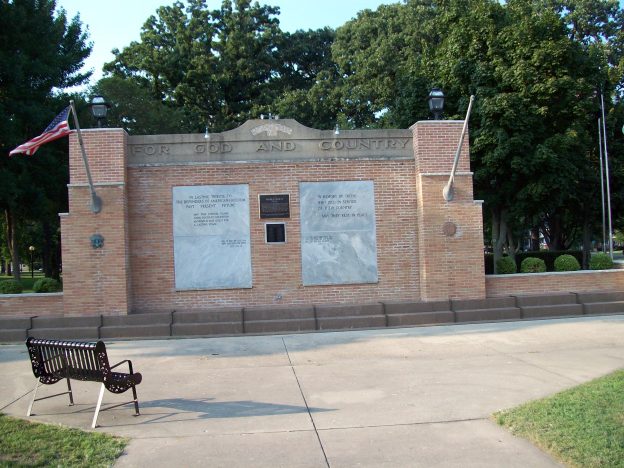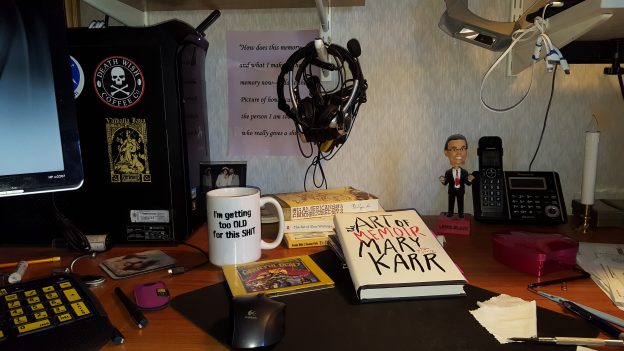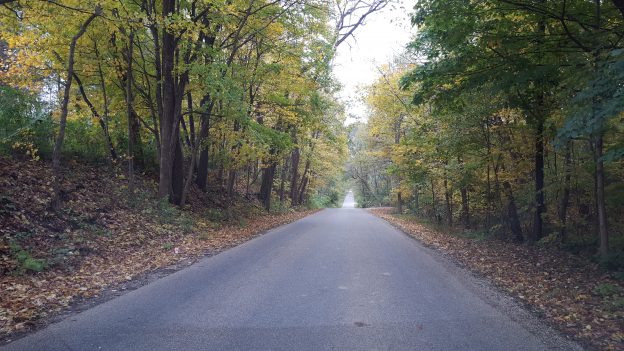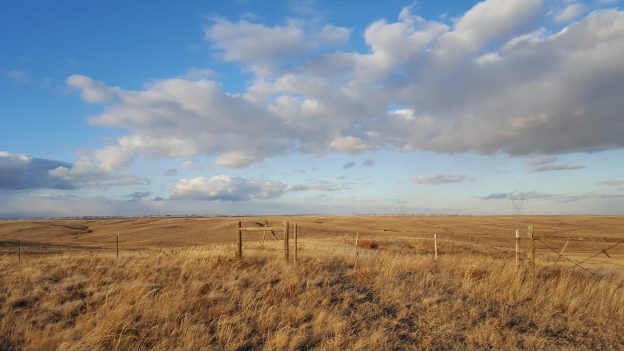Doctors make lousy patients.
I spent half the summer extolling the virtues of adequate hydration to pregnant woman whose urine specimens were as dark as Granny’s sweet tea, but then ignored my own advice.
Every August our church holds an outdoor mass at a local farm and family activity center owned by one of our parishioners. Several of us arrived early to move picnic tables and set up stands for hot dogs, drinks and dessert. The guys hauled out the four rusty barbecue grills made from steel drum halves and filled them with charcoal. The farm donated several dozen ears of corn which we soaked in Rubbermaid garbage cans half full of water.
We soaked the charcoal with lighter fluid and lit the grills about a half hour before Mass. If the coals didn’t seem hot enough, someone would squirt more fluid onto them, creating a fireball.
“Hey, I heard you’re not supposed to do that.” *wink wink, nudge nudge* Another shot of fluid and another fireball.
We loaded the grills with corn just as Mass started, turning the ears with gloved fingers as they roasted. I had my trusty grill tongs, one in each hand, and my heat-resistant gloves, which last year I discovered don’t work when wet. The heat became so intense none of us could stand close for very long.
The sun was hot and the sweat slithered down my neck. My arms started feeling heavy after about forty-five minutes and I knew I should probably drink some water. I trudged over to the table our family had commandeered and sucked down the rest of my McDonald’s iced tea from a large Styrofoam cup.
Now, I travel a lot for my work and often miss church functions. I didn’t want to seem like a slacker so I refilled my cup with water and headed back to the grills. Everyone else congregated around the covered wooden corn stand, sucking down bottled water. One would have thought that was an obvious sign from God: “Get out of the sun, dummy!”
I was staring at the grills, watching the corn husks charring, the heat blasting my face, when the world faded to black, and I felt the ground sneak up behind me. I imagined the cup was a stationary pole and grabbed for it as I went down, crushing it in my fingers. I thought This is going to hurt…and you’re going to look really stupid.
I grazed my shoulder on the antique plow surrounded by flowers, hit the grass and decided this was as good a time as any for a nap…
I heard voices which sounded far away.
“Hey, are you OK? What happened?”
“I think Jimmy must have pushed him.” There were a few chuckles but their concern was evident.
“He’s pretty warm. Someone get some water and pour it on his head and cool him off.”
“Do you think we should call 911?”
A small crowd had gathered. I still had my eyes closed when someone doused me with a couple of bottles of cold water. It felt good but I was still pretty toasty and asked for another bottle which I poured on my chest. A woman’s voice above my head asked, “Does anyone here know his medical history?”
By this time Peg had arrived and said, “I’m his wife.”
The other voice persisted, “Does anyone know if he has a heart condition?”
“I’M HIS WIFE!”
Lady if you don’t back off Peg is going to hurt you. Don’t poke the bear!
I opened my eyes and was looking up The Voice’s blouse. She was leaning over me, holding a tablecloth for shade. I said, “I’m still pretty hot.”
Someone handed me an open bottle which I poured onto my chest. I reached out for another one and lowered it to my mouth, I took a few deep gulps but then, momentarily forgetting I was flat on my back, lifted the bottle straight up and waterboarded myself. I struggled to turn on my side to drain my nose.
“What’s happening? Is he having a seizure?” The Voice again.
No, you idiot. I’m drowning.
I rolled to my side, snorted a few times and lay back. The Voice said, “His breathing is labored.”
“No, I’m not in labor.” This got a chuckle from everyone who knew me, but she didn’t and said, “He’s delirious.”
“Do you think we should call 911? Do you have insurance?”
Peg said, “Yeah, we have crappy church insurance,” which is true. Every year the premiums go up along with the deductibles and co-pays while the coverage gets more stingy.
“No, I’m fine. I’m just hot and a little dehydrated. Let me sit up for a few minutes and I’ll be OK.” I mentally imagined the cost of an ambulance ride and an emergency room visit; the dial in my head was running faster than a gas pump set for five bucks a gallon.
I heard a familiar voice at my feet. “I’m a personal trainer and my sister is a lab tech! We need to get his legs above his head.” She grabbed my feet and started lifting.
Oh God, no. That is the LAST thing I need.
Peg said, “Don’t do that; he has a bad back and you’ll hurt him.”
Listen to the lady and get your hands off me.
She persisted despite my wife’s objections and I foresaw another rumble.
Peg said, “Put something under his knees if you want but don’t lift his legs up.” One of the guys grabbed a couple of empty charcoal bags and chucked them under me. The personal trainer dropped my legs but tried another well-meaning but ridiculous intervention.
“I’m going to put a couple of bottles of water inside your groin. That will help cool you off.”
You gonna do WHAT??? Jesus, just leave me the fuck alone!
“We really should call 911.”
I knew I wasn’t going to win, but I didn’t want to give in and muttered, “Let Peg decide.”
She gave the OK and later told me, “I did it because if I said no they would have thought, ‘Gee, what a heartless bitch; she won’t call an ambulance for her poor husband.’ You’re a physician and I play one on TV but they aren’t going to listen to either one of us.”
So the call went out and about five minutes later the local ambulance and fire truck pull into the grounds. I’ve never understood why a fire truck always comes along since there’s nothing burning.
One of the paramedics asks how I’m feeling and The Voice says, “He’s cold and clammy.”
No shit. I’ve had four bottles of ice water poured on me.
Peg intervened, gave them a brief history, and I crawled onto the gurney. I’ve ridden in the back of an ambulance with a patient but I’ve never been the one being transported. Once inside they started asking me the usual questions: name; medical illnesses; allergies and any medications.
“Ranitidine; enalapril; aspirin; antihistamine and something for my prostate. It’s…uh…that blue one.” I couldn’t remember the name; maybe this was more serious than I thought.
“Ok, we’re going to start an IV, put some pads on you and do an EKG and check your blood sugar.”
They took their time, for which I was grateful because there’s nothing worse than trying to start an IV on someone with collapsed veins in a moving ambulance that rides like a 4X4 over railroad ties. We finally started moving and I watched the picnic grounds recede out the back window which reminded me of riding in the rear-facing third row seat of a 1960s-era station wagon.
The firemen, having nothing better to do on a Sunday afternoon, stayed around for another hour, feasting on roasted corn, sampling the desserts and socializing with the crowd. There’s much to be said for small-town life.
Peg arrived at the hospital long before the ambulance left and asked about me at the emergency room reception desk.
“We don’t have anyone here by that name.”
“Are you sure? I watched the paramedics put him in the ambulance.”
“Oh, wait. We had a call about a man who collapsed at a picnic. The ambulance should be here shortly.”
While she was waiting a man dressed in pajamas and carrying an old-time doctor’s bag walked up to the desk and said, “I’m Doctor Moore and I’m here to check into the hotel.” A woman behind him said, “No, I’m his sister and he’s here to see the psychiatrist.”
Just another day in the emergency department.
The ambulance pulled into the bay about ten minutes later. They pulled the gurney out and I shook hands with the paramedics before they wheeled me into an ER room. The nurse gave me a gown, asked me the same questions and said, “The doctor will be in shortly.” She hung a new IV bag before she left.
Someone brought Peg to my room; her sister showed up a few minutes later. They caught up on what happened after I left; I wondered where my barbecue tongs and gloves were.
The ER doc, a Denis Leary clone, came in a few minutes later and cut his spiel short when he found out I was a fellow physician. He ordered blood work and a 12-lead EKG, even though the one in the ambulance was normal, because there are protocols to follow and asses to cover. I’ve done the same even though I often think it’s a colossal waste of money.
Lab and EKG techs came and went. I dozed; they talked.
Then the woman who gets the insurance information entered. She may seem a humble employee, but she is the Most Important Person in the hospital since the hospital doesn’t get paid without her efforts. One would think the administrative suite would treat her like royalty, but to them she’s just another FTE, an interchangeable cog in the machinery.
My sister-in-law looked at the woman, paused for several seconds and said, “You look familiar.”
“So do you.”
“Do you go to Our Lady of Perpetual Trepidation?”
“Yes, I do.”
Suddenly it was Old Home Week and they chatted while I snoozed on the cart.
I was ignored for the next two hours. The nurse was staring at the computer screen when Peg went to tell her my IV bag was almost out. About 30 minutes later I needed to go the bathroom. Peg went back to the desk, found the nurse reading a book and the doctor futzing on the computer.
“My husband needs to use the bathroom. Do you have his labs back so we can get out of here?”
The ER doc came in after my potty break. My labs and EKG were normal – big surprise. He asked if I had a primary physician and I just snorted. (I told you doctors made lousy patients). We talked about ER patients and how he had to work another 20 years before he could retire. We finally left with instructions to make a follow up appointment with the primary care physician on call that day, something I had no intention of doing.
It’s probably just as well. Peg did some online research and discovered he was a Family Practice doc with three judgments and a state reprimand in only 11 years of practice. But that’s a story for another blog post.
A woman called the church office on Monday.
“I heard Peg talking about taking her husband to the emergency room and she seemed really worried about the cost. Do you think we should start a GoFundMe page for them?” Our insurance may not be the best, but it is far better than being uninsured
I got the tab a week later:
Ambulance ride: $1047
ER visit: $5681
ER Physician charge: $651
Humiliating yourself in front of a crowd: Priceless!




